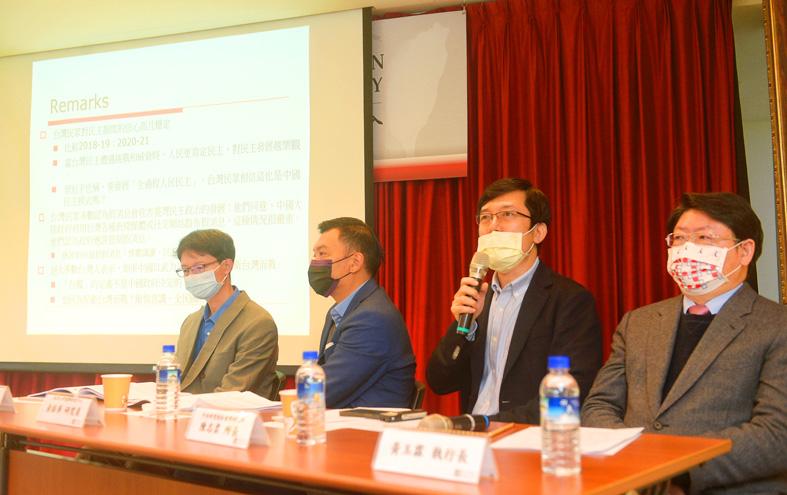Most Taiwanese, or 72.5 percent, are willing to fight for the nation in the event that China uses force to achieve unification, a poll released yesterday by the Taiwan Foundation for Democracy found.
However, asked whether they would fight against China if it attacked after Taiwan declared independence, the percentage of respondents who said they would fight fell to 62.7 percent, while 26.7 percent said they would not fight and 10.6 percent had no response, foundation president Huang Yu-lin (黃玉霖) told a news conference in Taipei hosted by the government-affiliated foundation.
The results suggest that the proportion of Taiwanese opposing unification is larger than those advocating Taiwanese independence, said Eric Yu (俞振華), a research fellow at National Chengchi University’s (NCCU) Election Study Center.

Photo: Chang Chia-ming, Taipei Times
A breakdown of the responses by age group showed that young people are more willing to defend the nation against a Chinese invasion, he said.
Showed the statement: “There might be some problems with democracy, but it remains the best system available,” 75.3 percent of respondents agreed, while 14.1 percent disagreed.
The results showed that 53.2 percent of respondents are satisfied with Taiwan’s democratic practices, while 40.6 percent are dissatisfied, with respondents in their 20s being the most satisfied, and those aged 60 or older the most dissatisfied.
More than half of the respondents, or 55.3 percent, are optimistic about the future of Taiwan’s democratic politics, while 36.5 percent are pessimistic, the poll showed.
Young people in Taiwan appear more confident about democracy, a trend that runs counter to the findings in many Western countries, where young people tend to distrust democracy, due to inequality and other social problems, Yu said.
Nostalgia over the nation’s authoritarian regime, which many older Taiwanese seem to have, might account for their having less faith in democracy, he added.
Compared with previous surveys conducted by the foundation, as well as Academia Sinica polls, support for democracy in Taiwan has been rising since last year, which might be due to growing unease toward China because of its increased pressure on the nation, Academia Sinica Institute of Sociology Director Jay Chen (陳志柔) said.
Further discussion might be needed as to what constitutes “Taiwanese independence,” the main point of contention between Beijing and the Democratic Progressive Party (DPP) government over the past few years, he said.
While most Taiwanese are willing to fight for the nation when it is threatened, more discussion is needed about war preparations and “all-out defense,” subjects less explored by the public, Chen said.
Asked about their political affiliation, 43.7 percent of respondents said they are independent or that circumstances change their preference, 26.3 percent identify with the DPP, 16.7 percent with the Chinese Nationalist Party (KMT) and 7.7 percent with the Taiwan People’s Party, while the rest affiliated with other political parties or had no response.
The poll, conducted from Aug. 10 to 15 by the NCCU Election Study Center, collected 1,299 valid responses — 874 via landline phone interviews and 425 via mobile phone interviews.
It has a confidence level of 95 percent and a margin of error of 2.72 percentage points.
This story has been amended since it was first published.

The Central Election Commission has amended election and recall regulations to require elected office candidates to provide proof that they have no Chinese citizenship, a Cabinet report said. The commission on Oct. 29 last year revised the Measures for the Permission of Family-based Residence, Long-term Residence and Settlement of People from the Mainland Area in the Taiwan Area (大陸地區人民在台灣地區依親居留長期居留或定居許可辦法), the Executive Yuan said in a report it submitted to the legislature for review. The revision requires Chinese citizens applying for permanent residency to submit notarial documents showing that they have lost their Chinese household record and have renounced — or have never

A magnitude 5.6 earthquake struck off the coast of Yilan County at 12:37pm today, with clear shaking felt across much of northern Taiwan. There were no immediate reports of damage. The epicenter of the quake was 16.9km east-southeast of Yilan County Hall offshore at a depth of 66.8km, Central Weather Administration (CWA) data showed. The maximum intensity registered at a 4 in Yilan County’s Nanao Township (南澳) on Taiwan’s seven-tier scale. Other parts of Yilan, as well as certain areas of Hualien County, Taipei, New Taipei City, Taoyuan, Hsinchu County, Taichung and Miaoli County, recorded intensities of 3. Residents of Yilan County and Taipei received

Taiwan has secured another breakthrough in fruit exports, with jujubes, dragon fruit and lychees approved for shipment to the EU, the Ministry of Agriculture said yesterday. The Animal and Plant Health Inspection Agency on Thursday received formal notification of the approval from the EU, the ministry said, adding that the decision was expected to expand Taiwanese fruit producers’ access to high-end European markets. Taiwan exported 126 tonnes of lychees last year, valued at US$1.48 million, with Japan accounting for 102 tonnes. Other export destinations included New Zealand, Hong Kong, the US and Australia, ministry data showed. Jujube exports totaled 103 tonnes, valued at

BIG SPENDERS: Foreign investors bought the most Taiwan equities since 2005, signaling confidence that an AI boom would continue to benefit chipmakers Taiwan Semiconductor Manufacturing Co’s (TSMC, 台積電) market capitalization swelled to US$2 trillion for the first time following a 4.25 percent rally in its American depositary receipts (ADR) overnight, putting the world’s biggest contract chipmaker sixth on the list of the world’s biggest companies by market capitalization, just behind Amazon.com Inc. The site CompaniesMarketcap.com ranked TSMC ahead of Saudi Aramco and Meta Platforms Inc. The Taiwanese company’s ADRs on Tuesday surged to US$385.75 on the New York Stock Exchange, as strong demand for artificial intelligence (AI) applications led to chip supply constraints and boost revenue growth to record-breaking levels. Each TSMC ADR represents